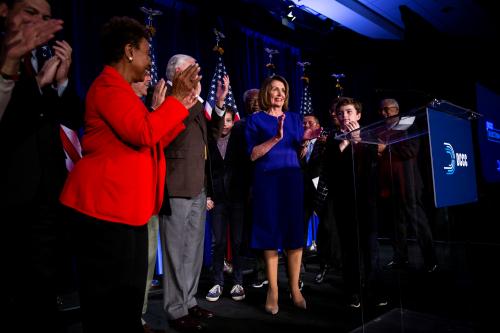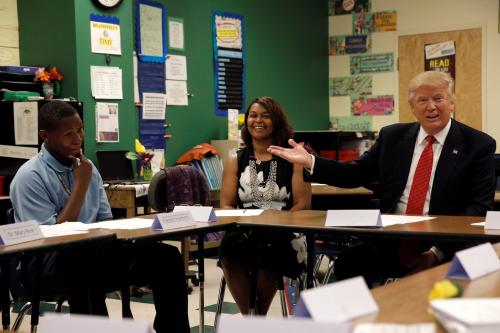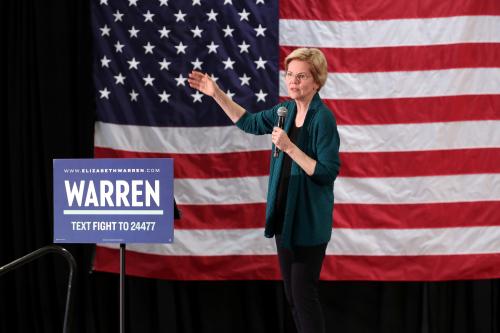We are just beginning the second year of Secretary of Education Betsy DeVos’s tenure, which thus far has been marked with contention since her turbulent confirmation process. Her popularity among teachers is shockingly low: A recent Education Week survey of teachers and school and district leaders shows that 72 percent of respondents have an unfavorable opinion of DeVos. For the sake of comparison, 67 percent of respondents have an unfavorable opinion of President Trump.
On the one hand, her unpopularity may hardly come as a surprise–she has been characterized as “one of the most divisive figures in Trump’s Cabinet.” Her missteps in her confirmation hearing, her lack of experience, and her divisive attitude toward school choice are obvious reasons why her favorability ratings may be low. But there’s another dimension to her leadership that, under other circumstances, might make her much more of an ally than an enemy to some on the left, particularly teachers’ unions: DeVos envisions a smaller federal role in education policymaking.
Consider the following episode: Early in 2017, Congress repealed the Obama administration’s regulation governing state accountability plans under the Every Student Succeeds Act (ESSA). Repealing this rule gave states much more flexibility in interpreting the law with respect to designing their new accountability frameworks. When the Department of Education subsequently released new guidelines for states to follow in writing their accountability plans, DeVos indicated that her department’s guidance would grant states “maximum flexibility” under the law.
Had DeVos not so thoroughly antagonized teachers’ unions early in her tenure, she might have earned more allies for this endorsement of flexibility, or at least experienced less outright hostility toward her leadership. Consider the somewhat counterintuitive politics of education policy, where some stalwart Democratic supporters, like teachers’ unions, tend to favor less federal government intervention. Some critiques of Obama-era education policy from the nation’s largest teachers’ union, the National Education Association (NEA), sound an awful lot like language DeVos herself uses regularly. For example, the NEA issued a statement in 2014 expressing disappointment that, in their view, former Secretary of Education Arne Duncan did not provide “common-sense flexibility from more of NCLB’s mandates” in his department’s guidance on waiver renewals.
As mentioned above, DeVos also describes flexibility as a policy priority. In November 2017, for example, she said, “I believe the role of the federal government should be as light a footprint as possible.” Her rhetoric praising state and local decisionmaking echoes what teachers’ unions often argued for during the No Child Left Behind era. To have a secretary of education willing to step out of the way should have been a welcome change, not just for Republicans, but for teachers’ unions as well. (Notably, the same cannot be said for civil rights organizations, such as the Leadership Conference on Civil and Human Rights, which has advocated in favor of federal oversight to protect students’ civil rights.)
What would happen if DeVos softened her language on school choice and continued to emphasize state and local control? We may be about to find out as year two of her term begins to unfold. Politico education reporters Kimberly Hefling and Caitlin Emma note that DeVos appears to be changing her tone, replacing rhetoric on school choice with less controversial phrases, like “innovation.” It remains to be seen whether this apparent pivot in rhetorical strategy will continue and whether her subsequent policy proposals will reflect this new language.
If DeVos continues in this direction, keep in mind that her preference for a smaller federal role echoes what unions have been clamoring for in recent years. In fact, her position favoring less federal intervention would also be consistent with placing more responsibility with educators and local leaders to be a part of the solution. However, in her public remarks she has often emphasized providing parents with more choice rather than focusing on educators. If she is looking to extend an olive branch to teachers at her one-year mark, DeVos might consider not only highlighting the role that parents play in their child’s education, but also discussing teachers as central components of students’ success (a position well-supported by research).
If DeVos chooses to modify her rhetoric in these or other ways, some of the hostility that characterized her first year in office may dissipate. Whether DeVos and her opponents would then choose to acknowledge and capitalize on their common ground is an open question, and the policy implications are even fuzzier. But it is worth remembering that this shared perspective, and perhaps even the possibility of productive bipartisan conversations, exist.
The Brookings Institution is committed to quality, independence, and impact.
We are supported by a diverse array of funders. In line with our values and policies, each Brookings publication represents the sole views of its author(s).








Commentary
After a divisive first year, will Betsy DeVos extend an olive branch?
February 14, 2018